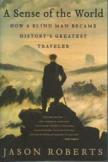As He Alone 'Sees' It
Jason Robertsa contributor to The Village Voice, among other publicationsbecame curious about a certain Englishman named James Holman after reading a brief chapter on him in a book about eccentric travelers. Trying to learn more about the 19th-century blind man and his extensive travels, Roberts was only able to find a few volumes of Holman’s own writing. Reading these antiquarian rarities, which were notably lacking in autobiographical detail, whetted Roberts’ appetite for more information about the man who was known as The Blind Explorer during his own lifetime.
Since no biography of James Holman existed, Roberts set out to remedy the situation; after three years of research he wrote A Sense of the World, a book that would document not just a profoundly inspiring figure, but one of history’s most richly lived lives.
Calling his subject a whirlwind of incongruities: an intrepid invalid, a poet turned warrior turned wanderer, a solitary man who remained deeply engaged with humanity, Roberts writes that Holman’s adventures were the blind man’s way of remaining connected to the business of life.
James Holman achieved near-mythic status with a series of journeys that took him to Siberia, Africa, South America, Australia, India, Turkey and the Middle East. More remarkable is the fact that Holman had lost his sight before he set out on these travels.
Although the written accounts of his early exploits created a stir and were deemed bestsellers in the 1820’s and 1830’s, by the time of his death in 1857 the Blind Traveler was all but forgotten.
The fourth of six sons, James Holman was born in 1786 and grew up in Exeter, England’s second busiest inland port. Although his early education was meant to prepare him for a genteel existence as an Anglican cleric, that all changed when he was 10. When a scandal rocked the school young James was attending, his parents pulled him from the disgraced academy and set him on a new course much more to his liking.
Under the sponsorship of Lord Bridgeport, Commander of the Channel Fleet, James Holman entered the Royal Navy as a Volunteer First Class. By the time he was in his early 20’s Holman was third lieutenant on board the H.M.S. Cleopatra.
Unfortunately, disaster struck when the young officer came down with a strange malady that immobilized him and eventually caused the loss of his eyesight. Holman was 25 years old, declared unserviceable and permanently blind; it appeared that his dream of seeing the world was shattered.
With his career at sea all but over, Holman applied for membership in the Naval Knights, a charitable organization. Much to his surprise, he was elected to the group of seven, select naval officers. The youngest person so honored, Holman would have his needs taken care of for the rest of his life. All the young lieutenant had to do was abide by the rules of the organization and enjoy a sedentary existence at Windsor’s Travers College, which would now be his home.
Rather than heralding the end of his dream of travel, however, the membership marked the beginning of a remarkable series of adventures. First, Holman traveled to Scotland, where he studied at the University of Edinburgh. Here the blind man honed his listening skills, which were to become so important in the years that followed.
Then in 1819, after a debilitating illness, Holman headed to the Continent to recuperate. Making all his own travel arrangements, he logged over 1,400 miles visiting six countries in just over two years. Upon his return to Windsor, Holman collected his experiences in his first book, The Narrative of a Journey.
As his travelogue was being delivered to bookstores, Holman was off again on another journey that would take him to Russia and across the frozen tundra of Siberia as far as Irkutsk. This two-year adventure was chronicled in another bestseller, the two-volume Travels Through Russia.
Holman’s wanderlust next took him to Fernando Po, an island off the coast of Africa, where he compiled the first written Fernandian-English dictionary and where he was also honored by having a river named after him. After his sojourn on the island, a very circuitous route home took Holman to South Africa, South America, Australia and southern Asia. He had a decade’s worth of new adventures to dictate, which resulted in four volumesA Voyage Around the World, released in 1834 and 1835.
In the years that followed, Holman slipped on his seven-league boots again to visit Spain, Turkey, Greece, Egypt and the Holy Land. Roberts conservatively estimates that by 1846 Holman’s travels exceeded a quarter of a million miles.
Although considered to be one of the most remarkable men of his age, the Blind Traveler, by the mid-1800’s, had become an anachronism. His final book, Holman’s Narratives of His Travels, was completed just a week before his death in 1857, but for reasons unclear was never published.
James Holman was not only the most prolific traveler of his time but also an example of what a sightless person could accomplish before Braille, the long cane, residential schools or vocational rehabilitation.
Using a number of sources, including Holman’s published work, newspaper and magazine articles, Admiralty records of the time, as well as material from the archives of Windsor Castle, Jason Roberts tells a story that is, in many respects, as incredible as it is entertaining. Holman was a unique individual whose accomplishments deserve to be lauded and remembered.
This article also appeared in print, under the headline “As He Alone 'Sees' It,” in the November 27, 2006, issue.








